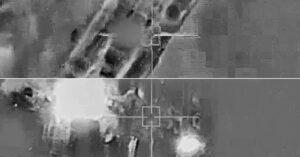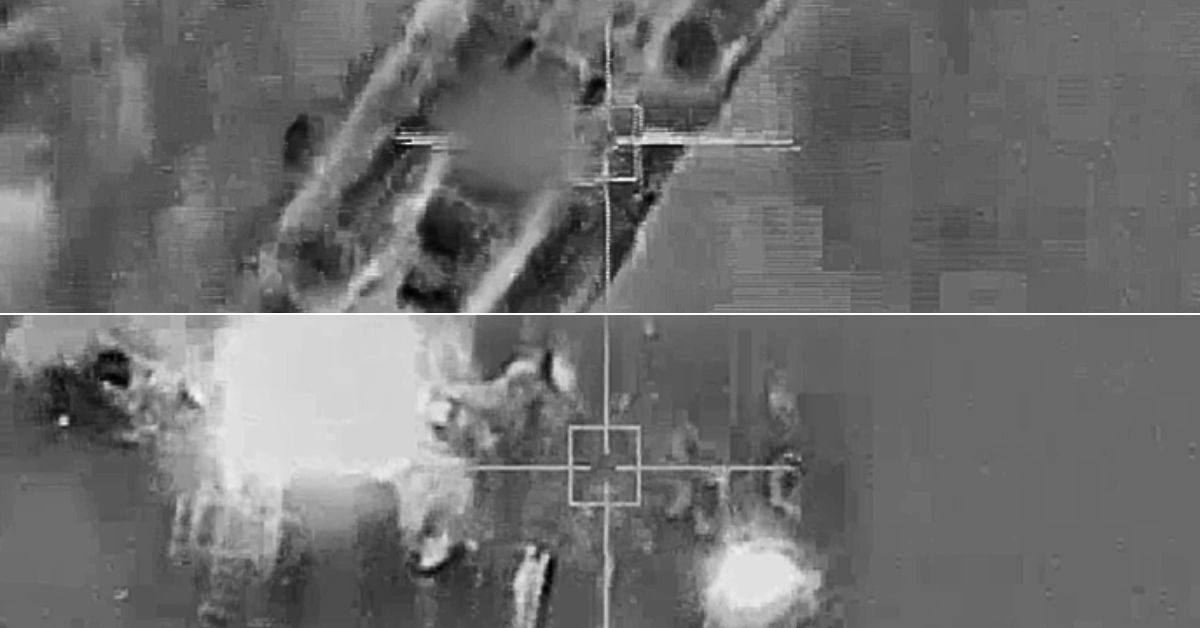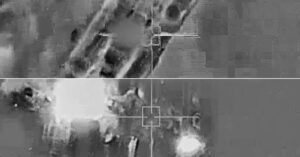
Watch: Australian Navy Makes History With Successful Launch Of Tomahawk Missile From Destroyer
December 11, 2024
U.S. Navy Destroys Houthi Attacks On U.S. Flagged Ships In Gulf Of Aden
December 11, 2024

The Israel Defense Force has carried out a series of air and naval strikes against Syria in the last few days. The operation aimed to destroy Syria’s strategic weapons stockpiles and military infrastructure to prevent these weapons from falling into the hands of terrorist groups.
The Israeli Navy carried out successful strikes on two key Syrian naval facilities, Al-Bayda and Latakia ports.
These facilities were home to 15 Syrian naval vessels. Along with this, the Israel Defense Force destroyed dozens of sea-to-sea missiles capable of reaching up to 190 kilometres.
These missiles, which could have threatened both civilian and military ships, were considered major threats.
Meanwhile, Israel’s Air Force conducted over 350 airstrikes on Syrian military targets. These attacks hit airfields, anti-aircraft batteries, and weapons production sites located in cities such as Damascus, Homs, Latakia, Palmyra and Tartus.
The strikes were aimed at preventing these weapons from being used by extremist groups, such as those linked to al-Qaeda and ISIS, who could have taken advantage of Syria’s unstable situation.
Israeli forces have targeted ground military assets, conducting airstrikes on 130 locations in Syria, including weapons depots, tanks, launchers, and firing positions.
Among the assets destroyed were Scud missiles, cruise missiles, surface-to-air and surface-to-sea missiles, drones, attack helicopters, fighter jets, and military radars.
These attacks significantly weakened Syria’s military capabilities.
In 48 hours, the IDF struck most of the strategic weapons stockpiles in Syria to prevent them from falling into the hands of terrorist elements. 𝗛𝗲𝗿𝗲’𝘀 𝘁𝗵𝗲 𝗯𝗿𝗲𝗮𝗸𝗱𝗼𝘄𝗻:
Naval Operations: Israeli Navy missile ships struck 2 Syrian Navy facilities… pic.twitter.com/6N1fz7BiMF
— Israel Defense Forces (@IDF) December 10, 2024
Video Credits: Israel Defense Forces/X
In response to the shifting political situation in Syria, Israeli officials have said they plan to create a “sterile defense zone” in southern Syria. This zone would be secured by Israeli forces but without a permanent troop presence.
Defence Minister Israel Katz said this measure was necessary to ensure that weapons did not fall into the hands of jihadist groups operating in the region.
Israeli Prime Minister Benjamin Netanyahu explained that the country’s actions were aimed at securing its borders. He said that Israel was not interfering in Syria’s internal affairs, but was simply taking necessary steps to protect itself.
He added that the airstrikes were focused on preventing strategic weapons left by the Syrian army from being seized by jihadist factions. After the collapse of President Bashar al-Assad’s regime, Israeli troops entered the demilitarized zone in southern Syria.
This zone, created after the 1973 Arab-Israeli war, includes the Syrian side of Mount Hermon. Israeli forces took control of an abandoned Syrian military post but denied claims they had moved further into Syrian territory.
A Syrian source had reported that Israeli troops had reached the town of Qatana, near Damascus, but Israeli military spokesperson Lieutenant Colonel Nadav Shoshani denied these reports, saying that Israeli forces were not moving towards Damascus.
Despite the fall of Assad’s government, Israel remains focused on protecting its borders and preventing weapons from reaching Hezbollah or other militant groups.
The recent strikes in Syria reminds of similar attacks Israel carried out in southern Lebanon where it targeted Hezbollah’s missile stockpiles.
While Israel has welcomed the end of Assad’s rule, it has expressed caution about the future of Syria. The leading rebel group, Hayat Tahrir al-Sham (HTS), has ties to extremist groups like al-Qaeda and ISIS, although it has tried to present a more moderate image in recent years.
Israel’s Defense Minister Katz did not provide specific details about the “sterile defense zone” but he discussed the importance of Israeli airpower in securing the region.
Netanyahu added that if any Iranian weapons were transferred through Syria to Hezbollah or if Israel were attacked, it would respond strongly.
References: The Hindu, Reuters
Source: Maritime Shipping News


